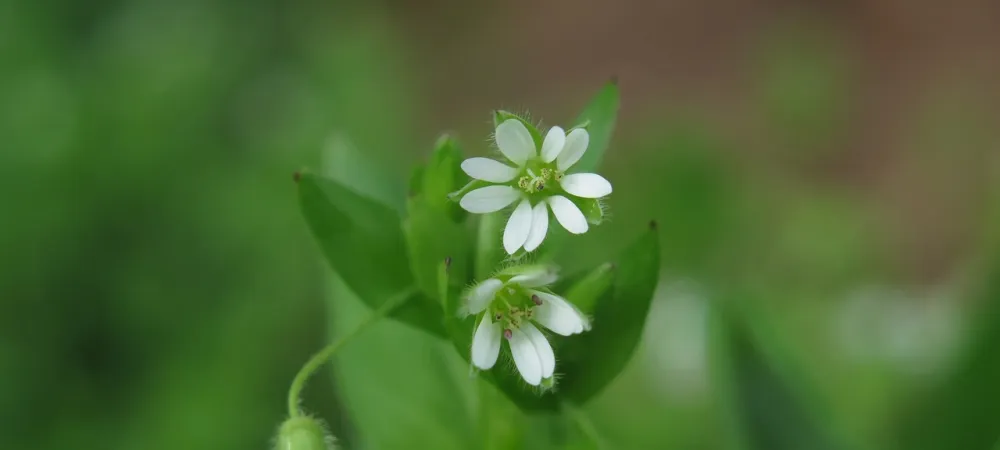How to Get Rid of Chickweed

Chickweed might look charming with its tiny, star-shaped flowers, but if it starts to take over your garden, it can quickly become a nuisance. This weed spreads fast, competing with your plants for space and nutrients. Luckily, getting rid of chickweed is not as daunting as it might seem. Whether you prefer mechanical methods, natural solutions, or chemical controls, we've got tips to help you get rid of chickweed efficiently.
How to Kill Chickweed
Each approach to getting rid of chickweed has its advantages and considerations. Here's what you need to know to make an informed decision on which method will best suit your gardening needs and environmental preferences.
Herbicides
If you're dealing with a widespread chickweed problem, herbicides can be a highly effective solution. These chemical agents are designed to target and kill weeds without the labor-intensive effort of manual removal. The best herbicides to kill chickweed are selective broadleaf herbicides that contain active ingredients like 2,4-D or dicamba. These herbicides specifically target broadleaf plants without harming grass, making them ideal for lawns.
- Pros: Can cover large areas quickly, requires minimal effort, targets specific weeds while preserving grass.
- Cons: Chickweed can develop a resistance to herbicides, chemicals can pose risks to the environment and wildlife.
Manual Removal
Manual removal is a straightforward and environmentally friendly approach to eradicating chickweed from your garden. This method involves physically pulling the weed from the ground, ensuring that you remove as much of the root system as possible to prevent regrowth. Manual removal is most effective when the soil is moist, as this makes it easier to pull out the entire plant, roots and all.
- Pros: No chemicals involved, provides immediate control, no purchase necessary.
- Cons: Requires physical effort, time-consuming, ineffective if not done properly.
Mulching
Mulching is an effective method for controlling chickweed by depriving it of the light it needs to grow. Applying a thick layer of mulch, such as wood chips, straw, or bark, over the affected area can help smother existing chickweed and prevent new seeds from germinating. This method is particularly useful in garden beds and around landscape plants where you want to maintain soil moisture and add aesthetic value while controlling weeds.
- Pros: Visually appealing, enhances soil moisture, no chemicals involved.
- Cons: Regular maintenance required, ineffective if not done properly.
Boiling Water
Boiling water is a simple and natural method to control chickweed by scalding the plant and its roots. This technique involves pouring boiling water directly onto the chickweed clusters. The intense heat destroys the plant's cells, causing it to die almost immediately. This method is particularly effective for spot treatments in driveways, patio cracks, and other hard surfaces where chickweed may grow.
- Pros: Fast-acting, no chemicals involved, no purchase necessary.
- Cons: Can kill any plant it comes in contact with, temporary solution, does not destroy roots.
Vinegar Spray
Vinegar spray is a popular home remedy for controlling chickweed, utilizing the acetic acid in vinegar to desiccate the plant’s leaves upon contact. This method involves spraying a diluted vinegar solution directly onto the chickweed, which quickly causes the leaves to dry out and the plant to die. It’s especially useful for treating chickweed in garden paths, patios, and other non-crop areas.
- Pros: No chemicals involved, requires minimal effort, budget-friendly.
- Cons: Can kill any plant it comes in contact with, lowers soil pH.
Corn Gluten Meal
Corn gluten meal acts as a natural pre-emergent herbicide, inhibiting the root development of chickweed seeds as they try to germinate. This method is most effective when applied to areas of your garden before chickweed appears, typically in early spring. It’s particularly useful in flower beds and vegetable gardens where you want to prevent weed growth without harming existing plants.
- Pros: Disrupts root formation, adds nitrogen to soil.
- Cons: Ineffective for existing weeds, rain can dilute its effectiveness.
Get Rid of Lawn Chickweed With The Green Team
While there are several DIY methods for controlling chickweed, managing a severe infestation can be challenging. For thorough and professional weed control, consider calling The Green Team. Our experts are equipped with the right tools and knowledge to effectively manage chickweed and other invasive species in your garden, ensuring your landscape remains healthy and beautiful. Contact us today if you're in the Charlotte, Roanoke, or Lynchburg areas!

